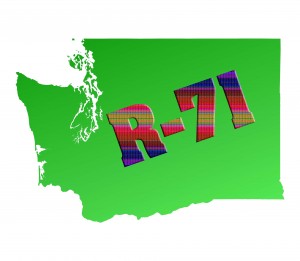Judge: Ruling on Doe v. Reed R-71 disclosure case in 2 weeks
U.S. District Judge Benjamin Settle says he will rule within two weeks on a request from gay-marriage foes that he permanently seal Referendum 71 petitions from public access. Settle didn’t indicate how he will rule, but did say at one point from the bench Monday that the record submitted by challengers is “devoid” of direct evidence of harassment that could result if the petitions are released.
Katie Blinn, state co-director of elections, said following a hearing in Tacoma that she’s optimistic Settle will rule in the Secretary of State’s favor and permit release of the 138,000 names of people who signed petitions more than two years ago to force a public vote on the state’s new “everything but marriage” domestic partnership law.
The U.S. Supreme Court, in a case called Doe v. Reed, ruled 8-1 last year that, as a general matter, releasing petitions doesn’t violate signers’ constitutional rights. But the court left open the possibility of an “as-applied” challenge to release of particular measures such as R-71.
As expected, Protect Marriage Washington, a group of anti-gay marriage activists who got the measure on the statewide ballot in 2009, headed back to Settle’s court to try to make the case for a permanent injunction against release under the Public Records Act. Settle is the judge who originally blocked release of the petition sheets in the fall of 2009, citing constitutional grounds. He was overturned by the 9th Circuit Court of Appeals and the Supreme Court.
The judge decided to read briefs from both sides and to hear from attorneys on Monday, but did not conduct a full trial. James Bopp argued for the challengers, and Deputy Solicitor General Anne Egeler represented Secretary of State Sam Reed and the state Elections Division. The Washington Coalition for Open Government and Washington Families Standing Together, a coalition that favored the new domestic partnership rights, also took part in the case.
Blinn said both sides were peppered with questions.
“We make it clear that this case is not about domestic partnerships, but about our longstanding elections policy that initiative and referendum petitions are public records. Without absolutely compelling evidence of harassment, we believe the courts will not overturn the policy of treating petitions as public record, a part of the electoral history of the state. It is a very high bar for anyone to have to prove.
“We know that political discussions get heated, otherwise they probably wouldn’t have risen to the level of a referendum and a campaign. Many issues, such as raising or lowering taxes, also get very heated.”
Secretary of State Sam Reed and Attorney General Rob McKenna continue to advocate for release of the signatures under terms of the broad voter-approved Public Records Act. The referendum process is citizen legislating and Washington voters expect the process to be open and transparent, not secret, Reed said. He said millions of petition signatures have been turned in in recent years, without report of harassment or intimidation that would “chill” the process. The R-71 donors’ identity has been posted on the Internet for two years, again without apparent controversy, he added.
Every state with the initiative process, except for California, treats petitions as releasable public records, McKenna noted.
R-71 petitions have not been released publicly, although a number of public records requests are pending. Reed’s office does not routinely release petitions or post them on the website, but rather responds to specific requests under the Public Records Act.
Postscript: Voters upheld the “everything but marriage” legislation by a 53-47 margin. Benefits to gay couples and senior opposite-sex domestic partners accrue to people on the Secretary of State’s registry. As of today, that’s 9,333 couples.
